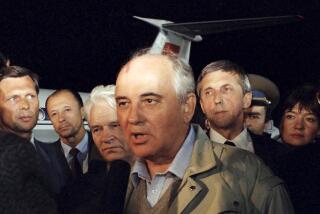Anti-Drinking Campaign Fails, Kremlin Admits
- Share via
MOSCOW — An intensive, three-year campaign against alcohol abuse--perhaps the most controversial of President Mikhail S. Gorbachev’s reforms--has not solved the country’s drinking problem, the Soviet Communist Party acknowledged Tuesday.
In a major policy statement, the party’s Central Committee called for renewed, steadier efforts at education and rehabilitation rather than harsher crackdowns, which so far have increased moonshining and embittered millions of Soviets who found it impossible to buy even a bottle of wine with which to entertain friends.
The Central Committee resolution appeared to signal both a relaxation of the government’s toughest anti-alcohol measures, which at times appeared aimed at making the Soviet Union a nation of teetotalers, and a greater commitment to the education of youth and the rehabilitation of individual alcoholics.
Indeed, the resolution attributes to the very harshness of the campaign its failure to cure the country’s endemic alcoholism, the Soviet Union’s major social problem. It follows a decision, taken quietly, to reopen many of the liquor outlets closed in 1985 and 1986 in great displays of state-enforced temperance verging on prohibition.
“Radical changes have not yet been achieved,” the official news agency Tass said, summarizing the resolution. “The wide possibilities created for intensified efforts to combat drunkenness and alcoholism have not been duly utilized in many regions.”
A solution to the complex problem, the resolution said, is “often reduced to administrative measures and to the conduct of short-lived, vociferous campaigns. The cause of combatting drunkenness is being greatly hampered by orientation toward prohibitive and peremptory methods, toward extremes and haste.”
In a policy shift that transcends the question of alcoholism, the resolution seems aimed at mollifying the widespread discontent over the way that the anti-alcohol campaign was carried out, producing a backlash of anger and making Gorbachev the butt of sarcastic jokes.
For Gorbachev, who committed his prestige to the effort, such a policy change would count as a setback, however it is minimized. But presumably he believes this would be offset by increased popular support for perestroika, as his reform program is known.
In recent weeks the number of liquor stores in Moscow and other major cities has been increased, along with their operating hours. Popular beer and wine bars, closed three years ago, are being reopened albeit in limited numbers and under tight controls. And restricted amounts of wine, beer and champagne are being sold again in groceries rather than only in liquor stores.
But the resolution warned officials against interpreting these changes, which were clearly approved at top levels of the party and government, as outright abandonment of the anti-alcohol campaign.
“Any departure whatsoever from the adopted course toward overcoming drunkenness and alcoholism is inadmissible,” the resolution said.
The resolution was praised for its realism by the Rev. J. W. Canty III, an Episcopal priest from New York and chairman of the joint Soviet-U.S. Conference on Alcoholism and Drug Addiction.
“What Mikhail Gorbachev did three years ago in challenging the nation to sober up was noble, but the follow-through by the bureaucracy was a joke,” Canty said. “It is not that the anti-alcoholism campaign has failed, because it has not--there are major, major successes. The problem is that you cannot end nine centuries of alcoholism in three years.”
Production Cut by 40%
Under the anti-alcoholism campaign launched by Gorbachev in May, 1985, shortly after he assumed the Soviet leadership, state production of alcohol has been cut by more than 40% and the price of a half-liter bottle of vodka has more than doubled. Now, such a bottle costs the equivalent of two days’ pay for an average worker.
The number of liquor outlets was reduced by nearly the same proportion, sales were restricted to afternoon and early evening, the legal drinking age was raised from 18 to 21, and penalties were increased for the illegal distillation of alcohol.
Some results have proved that the tough measures were justified and effective, according to Soviet authorities.
Alcohol-related crimes, previously 80% of all violent crimes, have been reduced by 36%, government statistics indicate. Industrial accidents and traffic accidents have declined sharply. Labor productivity is up, and the overall health of the population has improved.
But the deeper problems have remained, the party’s resolution said, and others have developed.
Moonshining has become so widespread that more than 500,000 people were prosecuted for it last year alone.
More to Read
Sign up for Essential California
The most important California stories and recommendations in your inbox every morning.
You may occasionally receive promotional content from the Los Angeles Times.











